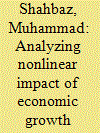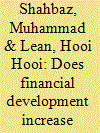|
|
|
Sort Order |
|
|
|
Items / Page
|
|
|
|
|
|
|
| Srl | Item |
| 1 |
ID:
176111


|
|
|
|
|
| Summary/Abstract |
Several Asian countries are facing challenges regarding the accomplishment of the objectives of Sustainable Development Goals (SDGs), and India is facing a similar situation. Following this, this study talks about designing an SDG framework for India, which can be used as a benchmark for other Asian countries. In this pursuit, this study looks into whether per capita income, energy use, trade openness, and oil price have any impact on CO2 emissions between 1980 and 2019. The nonlinear autoregressive distributed lag approach proves that the fluctuations in independent variables have an asymmetric long-term impact on CO2 emissions. The results reveal that the prevailing economic growth pattern in India is environmentally unsustainable, because of its dependence on fossil fuel-based energy consumption and imported crude oil. Import substitution has been identified as one of the first stepping stones to address this issue, and accordingly, a multipronged SDG framework has been designed based on the direct and extended version of the study outcomes. While the Central policy framework shows a way to address SDG 7, SDG 8, SDG 12, and SDG 13, the Tangential policy framework shows the way to sustain the Central policy framework by addressing SDG 4.
|
|
|
|
|
|
|
|
|
|
|
|
|
|
|
|
| 2 |
ID:
177499


|
|
|
|
|
| Summary/Abstract |
This study provides empirical evidence on the association between board attributes and corporate social responsibility (CSR) engagement—as well as between CSR engagement and corporate performance—in the global energy sector. The data for the period of 2011–2018 was obtained from Thomson Reuters. The results indicate that board diligence and CSR committees are robust drivers of CSR performance, as proxied by the composite environmental, social, and governance (ESG) score along with its three individual indicators. While board independence is more influential in boosting the aggregate ESG score and the governance indicator, the board's gender diversity is more influential in environmental and governance indicators. However, higher CSR performance does not guarantee higher financial performance—as proxied by both market and accounting performance. We provide theoretical and practical implications, to guide regulators and energy firms in ensuring the sustainable development of the sector.
|
|
|
|
|
|
|
|
|
|
|
|
|
|
|
|
| 3 |
ID:
150005


|
|
|
|
|
| Summary/Abstract |
This study investigates the long and short run relationships among carbon emissions, energy consumption and economic growth in India at the aggregated and disaggregated levels during 1971–2014. The autoregressive distributed lag model is employed for the cointegration analyses and the vector error correction model is applied to determine the direction of causality between variables. Results show that a long run cointegration relationship exists and that the environmental Kuznets curve is validated at the aggregated and disaggregated levels. Furthermore, energy (total energy, gas, oil, electricity and coal) consumption has a positive relationship with carbon emissions and a feedback effect exists between economic growth and carbon emissions. Thus, energy-efficient technologies should be used in domestic production to mitigate carbon emissions at the aggregated and disaggregated levels. The present study provides policy makers with new directions in drafting comprehensive policies with lasting impacts on the economy, energy consumption and environment towards sustainable development.
|
|
|
|
|
|
|
|
|
|
|
|
|
|
|
|
| 4 |
ID:
132763


|
|
|
|
|
| Publication |
2014.
|
| Summary/Abstract |
This paper explores the relationship between trade openness and energy consumption using data of 91 high, middle and low income countries. The study covers the period of 1980-2010. We have applied panel cointegration to examine long run relationship between the variables. The direction of causal relationship between trade openness is investigated by applying Homogenous non-causality, Homogenous causality and Heterogeneous causality tests.
Our variables are integrated at I(1) confirmed by time series and panel unit root tests and cointegration is found between trade openness and energy consumption. The relationship between trade openness and energy consumption is inverted U-shaped in high income countries but U-shaped in middle and low income countries. The homogenous and non-homogenous causality analysis reveals the bidirectional causality between trade openness and energy consumption. This paper opens up new insights for policy makers to design a comprehensive economic, trade and policies for sustainable economic growth in long run following heterogeneous causality findings.
|
|
|
|
|
|
|
|
|
|
|
|
|
|
|
|
| 5 |
ID:
121192


|
|
|
|
|
| Publication |
2013.
|
| Summary/Abstract |
The article investigates the impacts of imports and foreign capital inflows on economic growth of Pakistan over the period 1990 to 2010. We have applied the structural break autoregressive distributed lag (ARDL) bounds testing approach to cointegration to examine the long-run relationship between the variables. The vector error correction model (VECM) Granger causality multivariate framework is used to investigate the causal relationship between the series. Empirical analysis in this article confirms the long-run relationship between foreign capital inflows, imports and economic growth. The results indicate that foreign capital inflows and imports have positive and significant effect on economic growth in case of Pakistan. Causality analysis reveals the bidirectional causality between the variables, but strong causal relation is running from foreign capital inflows and imports to economic growth.
|
|
|
|
|
|
|
|
|
|
|
|
|
|
|
|
| 6 |
ID:
119263


|
|
|
|
|
| Publication |
2013.
|
| Summary/Abstract |
This study revisits the relationship between defence spending and economic growth via a Keynesian model in Pakistan using the autoregressive distributive lag bounds testing approach to cointegration. Empirical evidence suggests a stable cointegration relationship between defence spending and economic growth. An increase in defence spending reduces the pace of economic growth confirming the validity of Keynesian hypothesis in this case. Current economic growth is positively linked with economic growth of previous periods while a rise in non-military expenditures boosts economic growth. Interest rate is inversely associated with economic growth. Finally, unidirectional causality running from military spending to economic growth is found.
|
|
|
|
|
|
|
|
|
|
|
|
|
|
|
|
| 7 |
ID:
121748


|
|
|
|
|
| Publication |
2013.
|
| Summary/Abstract |
This study reinvestigates the effect of defence spending on economic growth using Zivot and Andrews and Lee and Strazicich, structural unit root tests and the autoregressive distributed lag bounds testing approach to cointegration in augmented version of Keynesian model for India. Study confirmed long run relationship among variables studied show that economic growth is positively affected by defence spending (also negative impact after a threshold point), investment and trade openness while negatively by interest rate. Granger causality analysis revealed bidirectional causal relationship between defence spending and economic growth as probed by variance decomposition approach.
|
|
|
|
|
|
|
|
|
|
|
|
|
|
|
|
| 8 |
ID:
111100


|
|
|
|
|
| Publication |
2012.
|
| Summary/Abstract |
This paper assesses the relationship among energy consumption, financial development, economic growth, industrialization and urbanization in Tunisia from 1971 to 2008. The autoregressive distributed lag bounds testing approach to cointegration and Granger causality tests is employed for the analysis. The result confirms the existence of long-run relationship among energy consumption, economic growth, financial development, industrialization and urbanization in Tunisia. Long-run bidirectional causalities are found between financial development and energy consumption, financial development and industrialization, and industrialization and energy consumption. Hence, sound and developed financial system that can attract investors, boost the stock market and improve the efficiency of economic activities should be encouraged in the country. Nevertheless, promoting industrialization and urbanization can never be left out from the process of development. We add light to policy makers with the role of financial development, industrialization and urbanization in the process of economic development.
|
|
|
|
|
|
|
|
|
|
|
|
|
|
|
|
| 9 |
ID:
146509


|
|
|
|
|
| Summary/Abstract |
This paper investigates the effect of military spending on external debt in case of Pakistan for the period of 1973–2009. For this purpose, the autoregressive distributed lag bounds testing approach to cointegration is used to examine cointegration among the variables. The ADF, P-P, and ADF-GLS unit root tests are applied to test the integrating order of the variables. The Ordinary Least Square (OLS) and error correction method regressions are used to investigate the marginal impact of military spending on external debt in the long and short run. Our findings indicate the existence of cointegration that confirms the presence of a long-run relationship among military spending, external debt, economic growth, and investment. Further, our results reveal that a rise in military spending increases the stock of external debt; an increase in investment also increases external debt; however, there is an inverse effect of economic growth on external debt. An implication of the findings reported herein is that there is a need to formulate a comprehensive economic policy for curtailing external debt in case of Pakistan.
|
|
|
|
|
|
|
|
|
|
|
|
|
|
|
|
| 10 |
ID:
135153


|
|
|
|
|
| Summary/Abstract |
The article aims to investigate the impact of nominal devaluation on income distribution in Bangladesh both in short and long runs. In doing so, Auto Regressive Distributed Lag (ARDL) bounds testing has been employed for cointegration, and Error Correction Model (ECM) has been used for short-run dynamics. The empirical psychology has confirmed the existence of long-run relationship between the variables. Furthermore our estimated results reveal that nominal devaluation tends to decrease income inequality. Though economic growth appears to improve income distribution, non-linear link between both the variables, however, depicts Kuznets’ inverted-U curve (1955). Financial development causes further deterioration in income distribution. Trade openness contributes to income inequality as discussed in Leontief Paradox.
|
|
|
|
|
|
|
|
|
|
|
|
|
|
|
|
| 11 |
ID:
125664


|
|
|
|
|
| Publication |
2013.
|
| Summary/Abstract |
This paper explores the effects of financial development, economic growth, coal consumption and trade openness on environmental performance using time series data over the period 1965-2008 in case of South Africa. The ARDL bounds testing approach to cointegration has been used to test the long run relationship among the variables while short run dynamics have been investigated by applying error correction method (ECM). The unit root properties of the variables are examined by applying Saikkonen and Lütkepohl (2002. Econometric Theory 18, 313-348) structural break unit root test. Our findings confirmed long run relationship among the variables. Results showed that a rise in economic growth increases energy emissions, while financial development reduces it. Coal consumption has significant contribution to deteriorate environment in South African economy. Trade openness improves environmental quality by reducing the growth of energy pollutants. Our empirical results also verified the existence of environmental Kuznets curve. This paper opens up new insights for South African economy to sustain economic growth by controlling environment from degrdation through efficient use of energy.
|
|
|
|
|
|
|
|
|
|
|
|
|
|
|
|
| 12 |
ID:
105771


|
|
|
|
|
| Publication |
2011.
|
| Summary/Abstract |
The aim of this paper is to re-examine the relationship between electricity consumption, economic growth, and employment in Portugal using the cointegration and Granger causality frameworks. This study covers the sample period from 1971 to 2009. We examine the presence of a long-run equilibrium relationship using the bounds testing approach to cointegration within the Unrestricted Error-Correction Model (UECM). Moreover, we examine the direction of causality between electricity consumption, economic growth, and employment in Portugal using the Granger causality test within the Vector Error-Correction Model (VECM). As a summary of the empirical findings, we find that electricity consumption, economic growth, and employment in Portugal are cointegrated and there is bi-directional Granger causality between the three variables in the long-run. With the exception of the Granger causality between electricity consumption and economic growth, the rest of the variables are also bi-directional Granger causality in the short-run. Furthermore, we find that there is unidirectional Granger causality running from economic growth to electricity consumption, but no evidence of reversal causality.
|
|
|
|
|
|
|
|
|
|
|
|
|
|
|
|
| 13 |
ID:
095047


|
|
|
|
|
| Publication |
2010.
|
| Summary/Abstract |
The present article aims at investigating the causal relationship between defense spending and terrorism in Turkey using the Autoregressive Distributed Lag (ARDL) bounds testing procedure and Granger-causality analysis. The findings reveal that there exists a unidirectional causality running form terrorist attacks to defense spending as expected, but not vice versa. In the light of this finding it can be inferred that military anti-terrorism measures alone are not sufficient to prevent terrorism.
|
|
|
|
|
|
|
|
|
|
|
|
|
|
|
|
| 14 |
ID:
149903


|
|
|
|
|
| Summary/Abstract |
The present paper re-examines the asymmetric impact of financial development on environmental quality in Pakistan for the period 1985Q1 to 2014Q4. A comprehensive index of financial development is generated using Bank- and Stock market-based financial development indicators. The results show that inefficient use of energy adversely affects the environmental quality. This suggests adoption of energy efficient technology at both production and consumption levels. These technologies would be helpful to improve environmental quality, enhance the productivity in long-run and save energy. Bank-based financial development also impedes the environment. The government should encourage lenders to ease the funding for energy sector and allocate financial resources for environment friendly businesses rather than wasting them in consumer financing.
|
|
|
|
|
|
|
|
|
|
|
|
|
|
|
|
| 15 |
ID:
107555


|
|
|
|
|
| Publication |
2011.
|
| Summary/Abstract |
The present study aims at investigating the causal relationship between defence expenditures and economic growth in the case of North Cyprus using the Autoregressive Distributed Lag (ARDL) bounds testing approach to cointegration and Granger causality tests for the period from 1977 to 2007. The results suggest that the variables in question are in a long-run equilibrium relationship and that there exists a strong, positive unidirectional causality running from defence expenditures to economic growth.
|
|
|
|
|
|
|
|
|
|
|
|
|
|
|
|
| 16 |
ID:
125866


|
|
|
|
|
| Publication |
2013.
|
| Summary/Abstract |
In the previous decades, a number of studies have been conducted to analyse the causal relationship between electricity consumption and economic growth in the Portuguese economy. However, the evidence remains controversial because the previous studies do not provide clear causality evidence. This might be attributed to the omitted variables bias because most previous studies only focus on the relationship between electricity consumption and economic growth in a bi-variate model. This paper attempts to re-investigate the relationship between electricity consumption and economic growth in Portugal using a multivariate model. Based on the bounds testing approach to cointegration and the Granger causality test within the vector error-correction model (VECM), our empirical results confirm the presence of cointegration among the variables. Moreover, there is evidence of bi-directional causality between electricity consumption and economic growth in the short- and long-run. This suggests that energy is an important source of economic growth in Portugal. Therefore, energy conservation policies should not be implemented because it would deteriorate the process of economic growth and development of the Portuguese economy.
|
|
|
|
|
|
|
|
|
|
|
|
|
|
|
|
| 17 |
ID:
128051


|
|
|
|
|
| Publication |
2014.
|
| Summary/Abstract |
This paper examines the impact of natural gas consumption, real gross fixed capital formation and trade on the real GDP in the case of Tunisia over the period 1980-2010. We use an Autoregressive Distributed Lag (ARDL) bounds testing approach to test for cointegration between the variables. The Toda-Yamamoto approach is then used to test for causality. Our findings indicate the existence of a long-term relationship between the variables. Natural gas consumption, real gross fixed capital formation and trade add in economic growth. Natural gas consumption, real gross fixed capital formation and real trade cause real GDP in Tunisia. These findings open up new insights for policymakers to formulate a comprehensive energy policy to sustain economic growth in the long-term.
|
|
|
|
|
|
|
|
|
|
|
|
|
|
|
|
| 18 |
ID:
124713


|
|
|
|
|
| Publication |
2013.
|
| Summary/Abstract |
This study uses the annual data from 1972 to 2010 to assess the causal relationship between electricity consumption and real output at the aggregate and sectoral levels in Pakistan. This study covers three main economic sectors in Pakistan namely agricultural, manufacturing and services sectors. Our cointegration results reveal that the variables are cointegrated at the aggregate and sectoral levels. At the aggregate level, we find that there is uni-directional Granger causality running from electricity consumption to real output in Pakistan. At the sectoral level, we find that electricity consumption Granger-causes real output in the manufacturing and services sectors. However, there is no causal relationship between electricity consumption and real output in the agricultural sector. The policy implication of these results is that electricity conservation policies in general would deteriorate the process of economic growth as well as the real output in the manufacturing and services sectors in Pakistan. Nevertheless, we suggest the Pakistani government to implement the electricity conservation policies merely to the agricultural sector because such policies may have less or no adverse impact on its real output.
|
|
|
|
|
|
|
|
|
|
|
|
|
|
|
|
| 19 |
ID:
149883


|
|
|
|
|
| Summary/Abstract |
This paper detects the direction of causality among carbon dioxide (CO2) emissions, energy consumption, and economic growth in Next 11 countries for the period 1972–2013. Changes in economic, energy, and environmental policies as well as regulatory and technological advancement over time, cause changes in the relationship among the variables. We use a novel approach i.e. time-varying Granger causality and find that economic growth is the cause of CO2 emissions in Bangladesh and Egypt. Economic growth causes energy consumption in the Philippines, Turkey, and Vietnam but the feedback effect exists between energy consumption and economic growth in South Korea. In the cases of Indonesia and Turkey, we find the unidirectional time-varying Granger causality running from economic growth to CO2 emissions thus validates the existence of the Environmental Kuznets Curve hypothesis, which indicates that economic growth is achievable at the minimal cost of environment. The paper gives new insights for policy makers to attain sustainable economic growth while maintaining long-run environmental quality.
|
|
|
|
|
|
|
|
|
|
|
|
|
|
|
|
| 20 |
ID:
124709


|
|
|
|
|
| Publication |
2013.
|
| Summary/Abstract |
This paper investigates the causal relationship between economic growth, urbanisation and electricity consumption in the case of Angola, while utilizing the data over the period of 1971-2009. We have applied 39 and 40 unit root tests to examine the stationarity properties of the series. Using the Gregory-Hansen structural break cointegration procedure as a complement, we employ the ARDL bounds test to investigate long run relationships. The VECM Granger causality test is subsequently used to examine the direction of causality between economic growth, urbanisation, and electricity consumption. Our results indicate the existence of long run relationships. We further observe evidence in favour of bidirectional causality between electricity consumption and economic growth. The feedback hypothesis is also found between urbanisation and economic growth. Urbanisation and electricity consumption Granger cause each other. We conclude that Angola is energy-dependent country. Consequently, the relevant authorities should boost electricity production as one of the means of achieving sustainable economic development in the long run.
|
|
|
|
|
|
|
|
|
|
|
|
|
|
|
|
|
|
|
|
|